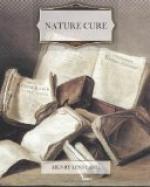This part of the human entity can evolve and progress only through its own conscious and voluntary personal efforts.
In this, Man differs from the animal creation. The animal is able to take care of itself shortly after birth. It inherits, already fully developed, those brain centers for the control of the bodily functions which the newborn human must develop slowly and laboriously through patient and persistent effort in the course of many years.
Of voluntary capacities and powers the newborn infant possesses little more than the simplest unicellular animalcule, that is, about all it can do is to scent and swallow food. Its cerebral hemispheres are as yet blank slates, to be inscribed gradually by its conscious and voluntary exertions. Before it can think, reason, speak, walk or do anything else, it must first develop in its brain special centers for each and every one of these voluntary faculties and functions.
Through these persistent personal efforts, reason, will and self-control are gradually evolved and developed; while the animal, being hereditarily endowed with the faculties and functions necessary for the maintenance of life, has no occasion for the development of the higher faculties and powers and therefore remains an irresponsible automaton, which cannot be held accountable for its actions.
To recapitulate: Freedom of choice and of action distinguish the human from the animal. In the animal kingdom, reasoning power and freedom of action move in the narrow limits of heredity and instinct, while Man, through his own personal efforts, is capable of unlimited development physically, mentally, morally and spiritually, both here and hereafter. We say physically advisedly, for in the spiritual realms, in the life after death, the physical (spiritual-material) body also is capable of deterioration or of ever greater refinement and beautification.
Through the right use of his voluntary faculties, capacities and powers, Man is enabled to become the master of himself and of his destiny.
Thus we find that the human organism consists of two distinct parts or departments, the one acting independently of the ego and deriving its motive force from an unknown source and the other under the conscious and voluntary control of the ego.
This two-fold nature of the human entity justifies the two-fold attitude of mind and soul, on the one hand the prayerful and faithful dependence upon that mysterious power which flows into us and controls us through the sympathetic nervous system and on the other hand the conscious and voluntary dominion over the various faculties, capacities and powers with which Nature has endowed us.
It is our privilege and our duty to maintain both attitudes, the dependent as well as the independent. The desire and the will to plan, to choose and to perform are ours, but for the power to execute we are dependent upon a Higher Source.




